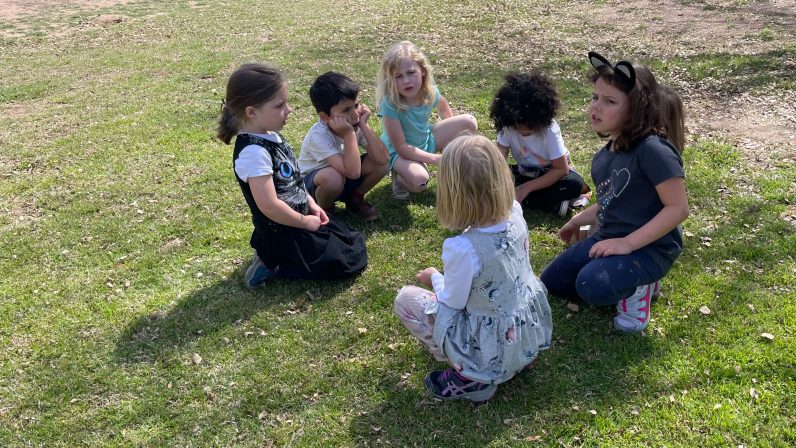This week I’ve had the opportunity to observe our three youngest classes as part of our annual teacher evaluation process. Additionally, we had another teacher presentation from our professional development series featuring classroom practices. These experiences, as well as more time doing playground supervision, gave me plenty to write about. When I looked for a common thread, there was always something about negotiating life among other humans.
On Monday afternoon, our Toddler 1s teacher met with the lead staff to present her classroom practices. She included a tour of the room, specific ways certain equipment is used, and books she uses with toddlers to lay the foundation for social justice learning. A board book called Yes! No! A First Conversation about Consent led to a conversation about why it’s important to teach young children they can say YES or NO, regarding personal space, other people touching their hair, and receiving mandatory hugs. It elevated the importance of the valuable work present in our toddler program.
Earlier that day I was in the Toddler 2s class, observing a lively group of young 2-and 3-year-olds. Several of them were tightly clustered in the dramatic play/kitchen area. A couple friends became a bit physical with each other, and I tipped off the teacher that she might want to wander over and take a look. She immediately situated herself right in the middle of the action, sitting at their level to work her magic. In a short time she used language to model how to ask for and a turn, use gentle hands, and check to see if someone is okay. Certain children were relocated to different areas of the room, and the morning went on peacefully. Children were empowered to stand up for themselves and express their wants and needs.
On the playground a small group of kindergarteners approached me saying that another small group wasn’t letting them play. I asked if they needed help talking about it and they said they did. When we approached the group, the situation was what I expected: an original game created by a small group that another group wanted to join and significantly change. For many years our school has adopted the You Can’t Say You Can’t Play approach, which basically means that if anyone is allowed to play, then everyone who wants to play must also be allowed. We all sat down in a circle and I began asking questions. Members from both groups began talking and listening, and I could see they were beginning to work it out. Finally I said, “Do you need me here or do you think you can work it out yourselves?” They all agree that they could handle it, so I happily slipped away.
A few minutes after that there was a conflict between two older students. One said they were being accused of something they didn’t do and asked if I’d talk to their friend about it. Since I didn’t really know the details, I suggested they handle it right away during recess instead of me doing the talking. With some reluctance they walked across the playground, and the two had a conversation. Later I checked in on them, and they both said, “We’re fine.” They knew what to do and did it.
If there’s anything I learned this week, it’s that the work we do here to help children develop and use their voices is crucial for their future well being, and for the well being of everyone. I look forward to hearing stories about how these children put their early Seed practices to work as they grow up.

